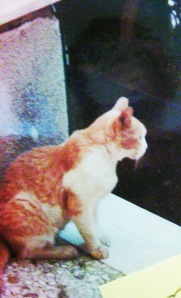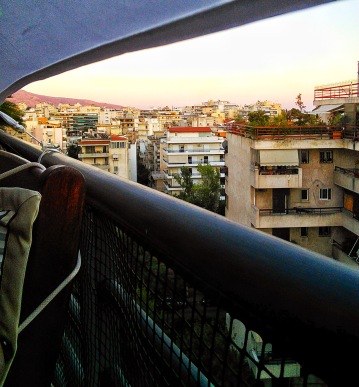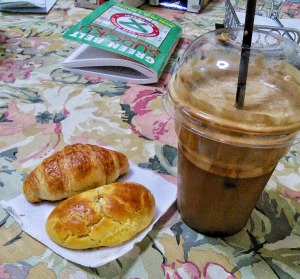The problem was that we didn’t know if it was a boy or a girl. The cat had already thoroughly adopted us, and there was no going back from that.
We christened the cat “Minnie” after my mom’s childhood pet and also after a mouse I have a feeling Miss Minnie-the-Cat would not have gotten along with. Or, occasionally, he became “Mimi,” the Greek diminutive of “Dimitri” because it sounded close enough to “Minnie” that we didn’t think he’d mind. She. It.

Minnie the androgynous cat was either an enormously overweight male or a perpetually pregnant female. We couldn’t decide which. But what we did decide, about a week after she adopted us, is that we had met this cat before.
Do you know what they say about cats never forgetting? Well, they might be onto something.
Years and years ago, my dad spotted a kitten dying in the middle of the street under the sweltering August sun. We don’t know why it was there or how it got to be there, but I do remember how incredibly orange the poor creature was, a squirming rag doll of fiery fur, and how incredibly small. It’s no wonder the mother lost track of that kitten–if there ever was a runt, then this was it.
But my dad carried the poor little thing into the shade of a large olive tree, where the neighborhood cat lady would leave out bowls of water and scraps. Sure enough, the moment we turned our backs, the mother came padding along behind us, straight to the little baby cat. There is another reason we called her Minnie, and it was not for the mouse but for her size before she grew up into a vibrant creature we did not recognize.
The androgynous orange cat stuck around our home in Athens ever since. Minnie was ever-vigilant, guarding the apartment while we were off spending the rest of the year in New York. But when we would return during the summer, there would inevitably be a dead bird or some other offering at our doorstep, and she would purr at us as we hung the laundry in the garden, and rub her head against our legs with such an intensity, I had to be careful not to trip and fall. She even tried to make it into the house once. More than once. All right, it was a fairly regular occurrence.
This summer there was no trace of Minnie the big red cat. A rat from the seaside had left her much worse for the wear, and she was much too ferocious, much too wild to let the veterinarian handle her when the neighborhood pitched in to see if they could have her treated. An infection ate away at her face. But before that she simply vanished.
This year there was a white cat waiting on our doorstep–and she is most definitely a she and had no reservations about letting us know it. She has a beautiful long-haired coat and incredible green eyes, but is much too shy and much too proud to hang around peasants like us, a true cat to the core.
I call her “Snow” because there is not a patch of non-white fur on her, but I think, in truth, she is more of a “Ghost.” The ghost of a kitten that was more dog than cat, more human than anything else.
–Marie-Irene


